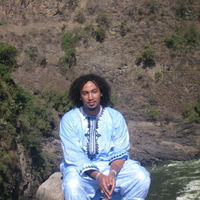Book Chapters: Australian Literary Studies by Bill Ashcroft
Despite Goethe’s ideal of Weltliteratur – the dream of ‘a common world literature transcending na... more Despite Goethe’s ideal of Weltliteratur – the dream of ‘a common world literature transcending national limits’ world literature still seems unable to challenge the importance of the nation in the institution of literature and literary study. The very question asked by this conference – Is Australian literature a World Literature? – seems to bear this out. This paper sees the synchronicity of Australian and world literature as a process of reading beyond both the terms ‘world’ and ‘nation’. I will examine the shared utopianism that links various post-colonial literatures through a vision of what Ernst Bloch calls Heimat – the home we have all sensed but never experienced. Australian literature shares with other literatures this hope for the future – a home beyond the nation. I will explore this transcultural, transnational connection through various texts
This paper attempts to reconfigure our conception of epistemology by examining the forms of ‘know... more This paper attempts to reconfigure our conception of epistemology by examining the forms of ‘knowing’ that may exist in the transcultural space between cultures, a form of ‘knowing’ before or beyond the interpretation of meaning. I ask the question Can we understand that which we cannot share? Can we ‘know’ before we understand? And if so what is it to know in this way? An answer to the question may lie in the concept of Presence introduced by Hans Gumbrecht. Presence will be examined in various Aboriginal texts through their ‘material resonance’. The paper will also investigate indigenous ways of ‘knowing time’ through the dialectical image.
In B. Neumeier, & K. Schaffer (Eds.), Decolonizing the Landscape: Indigenous Cultures in Australia (pp. 107-128). Amsterdam, New York: Rodopi.

Physical sight may be understood as a model for cultural representation. Just as the visible worl... more Physical sight may be understood as a model for cultural representation. Just as the visible world must be built up from assumptions and expectations, and contextualized by new experience, so colonial cultures like Australia’s are ‘seen’ in the way we have learned to see them. Representation is never simple picturing but a process of giving concrete form to ideological concepts. The most fascinating examples of this occur in the visual representation of Australian space.
When we observe the ways in which Australia has been ‘seen’ we understand something about what it has become. Australia was imagined (or ‘seen’) in a particular way in Europe before white society arrived, it was seen by the early colonists according to certain conventions and expectations, it continues to be seen in certain ways by migrants. In all its cultural productions it demonstrates a history of seeing. This paper examines the origin and history of ways of seeing Australia and identifies the role of literature, painting and film in both perpetuating inherited ways of seeing, but also ‘unlearning’ and transforming them at nodal points in history.
Chapter 1 in Visualising Australia: Images, Icons, Imaginations (vol.11 Koala: Konzepte Orientierungern Abhandlungen Lekturen Australien Studien) Trier: Wssenschaften Verlag Trier 2014: 19-38

The issue of silence has been the focus of considerable debate in Coetzee criticism, ranging from... more The issue of silence has been the focus of considerable debate in Coetzee criticism, ranging from Benita Parry’s condemnation of the silence of the white writer in Africa, to Derek Attridge’s assertion that Coetzee’s silence finds itself operating in the realm of canonicity itself. This paper approaches the question of silence within the context of an analysis of utopianism in post-colonial writing. Coetzee’s silence represents a form of agonism that appears the opposite of utopianism but which, by resisting the imperial function of narrative itself opens up a curiously grounded utopian space, one best described by Foucault’s concept of heterotopia. Coetzee’s move to Australia may be seen, in retrospect, to open up the political trajectory of the novels to reveal their broadly ethical dimension, one that addresses the ethical engagement of writing and reading. The function of silence in this is to do nothing less than disrupt the authority of the writing, leaving the figure of the writer in a space of radical ambivalence – a silent but curiously authoritative heterotopia in which the possibilities of the text are realised.
This essay traces the influence of Augustine on the Australian post Francis Webb.
Examines the intersection of postcolonial and feminist issues in Kate Grenville's Lilian's Story.
This essay demonstrates that 'postcolonial' is a way of reading and despite the vexed question of... more This essay demonstrates that 'postcolonial' is a way of reading and despite the vexed question of the settler colonies, which are both colonisers and colonised, Australian literary production can be read for the effects of imperial discourse and its resistance to dominant cultural influences.

Peter Carey's The Unusual Life of Tristan Smith seems uncannily prophetic, not so much in its pre... more Peter Carey's The Unusual Life of Tristan Smith seems uncannily prophetic, not so much in its prediction of war but in its reading of the continuing post-colonial dilemma of Australia's relations with a neo-imperial power. The anxiety and mendacity of Australian cultural life and its political subjection to yet another imperial power are outlined with mischievous clarity in the novel, which hinges on the idea of culture as performance and cultural struggle as the contest of different forms of theatre. I want to propose that the central trope of the novel is simulation, which immediately invokes Baudrillard's despairing conclusion that the dominance of simulacra and hyperreality in postmodern culture puts it beyond any kind of political intervention. The problem with Baudrillard's pessimism is that he assumes there is only one culture in the world - postmodern culture. On the contrary, Carey's novel proposes that the field of representation is the field of cultural struggle, and within this field, a cultural politics is still possible because simulacra operate in different ways in different cultures. In effect, he presents a post-colonial role for mimicry and simulation which reinstates, or at least refuses to abandon, the 'real.' This makes the novel a useful focus for considering the argument between postmodern pessimism about a material politics and the post-colonial analysis of transformative powers of cultural production in political resistance.
in Andreas Gaile (ed) Fabulating Beauty: Perspectives on the Fiction of Peter Carey. Rodopi: Amsterdam/New York, NY, 2005, pp. 199-214
Examines the interactive concepts of 'Presences' and 'Sacred' in Patrick White's novels.
While the stereotype of Australian culture is one of relentless secularism, this essay examines t... more While the stereotype of Australian culture is one of relentless secularism, this essay examines the persistence of visions of the sacred in literary writing.
From Makarand Paranjape ed. Sacred Australia Melbourne: Clouds of Magellan, 2009: 21-43.
This essay examines the rise of modernism in Australia, contesting the myth of belatedness and su... more This essay examines the rise of modernism in Australia, contesting the myth of belatedness and suggesting that modernity arises from multiple sources rather than inherited from Europe.
Book Chapters: Postcolonial Studies by Bill Ashcroft

Through the resonance of their materiality, literary texts may produce a different form of knowin... more Through the resonance of their materiality, literary texts may produce a different form of knowing, of ‘knowing beyond meaning’ as the ‘thingness’ of the text unlocks a vast hermeneutic surplus. While unfolding in time, novels take us out of time. But the African novel may also produce a ‘knowing’ of a different form of time, a circular, folded or layered time in which a past is apprehended within the present. The post-colonial African novel produces an ontological circularity that revolves around the cultural disruption of colonialism, which, according to Emmanuel Eze, has led African writers to present an experience of broken time. In response this essay investigates the production of time in three novelists, Chinua Achebe, Dambudzo Marechera and Ben Okri to demonstrate that rather than broken, time is ‘folded’ or layered. This is a critical distinction because production of time in this way confirms the tenacity and adaptability of African cultures and may be taken as a model for Afro-modernity itself. By invoking a ‘knowing’ of circular time, of a past folded into the present, a knowing that exists beyond the interpretable meaning of the text, African novels reveal that an alternative modernity may proceed in a very different way from the linear progression that has defined the modern.
Chapter 4 in Brenda Cooper and R. Morell eds. Africa-Centred Knowledges; Crossing Fields and Worlds London: James Curry: 64-77.
This paper examines the processes involved in postcolonial writers writing in English. In particu... more This paper examines the processes involved in postcolonial writers writing in English. In particular those linguistic neologisms and syntactic variations that come from the mother tongue are seen to be metonymic of the source culture rather than intrinsically cultural specific language.
This is an application of Hans Ulrich Gumbrecht's concept of Presence the engagement with the ma... more This is an application of Hans Ulrich Gumbrecht's concept of Presence the engagement with the materiality of the text, beyond hermeneutics – to the transcultural postcolonial text in English.

Despite the reassertion of the nation-state during the Global Financial Crisis, the nation contin... more Despite the reassertion of the nation-state during the Global Financial Crisis, the nation continues to be a contested term in post-colonial theory. For India, the stroke of midnight ushering in the 15th August 1947 was not just the trigger for Rushdie’s Midnight’s Children but a moment around which much Indian literary energy circulates. Critics have been divided about Rushdie’s commitment to the nation but it seems clear that nationalism, and its boundary marking, are roundly disparaged in this and other novels by Rushdie. This essay argues that not only does Midnight’s Children elaborate the fundamental post-colonial disillusionment with the concept of nation but that the ambivalent legacy of the novel – in a country for which independence, and its champions, achieved mythic status – is a profound scepticism about the idea of nation. This legacy is nowhere more powerfully elaborated that in Amitav Ghosh’s Shadow Lines. Although published at the beginning of the 1990s the book’s devastating denunciation of nationalism and national borders, and its multi-layered narrative of memory and identity, continues to resonate in a world in which borders articulate a world-wide territorial paranoia. It stands as a powerful prelude to the present century, in its view of the great deception of nationalism and the illusory nature of borders.
Contemporary Anglophone Indian texts demonstrate a critique of the nation that has its origins in... more Contemporary Anglophone Indian texts demonstrate a critique of the nation that has its origins in the ideas of Tagore and Gandhi.
This essay examines the influence of Bakhtin'sd concept of Menippean satire in Zimbabwean novelis... more This essay examines the influence of Bakhtin'sd concept of Menippean satire in Zimbabwean novelist Dambudzo Marechera's writing.
This is the Introduction to Literature for Our Times: Postcolonial Studies in the Twenty First Ce... more This is the Introduction to Literature for Our Times: Postcolonial Studies in the Twenty First Century, which argues that despite the robust arguments characterising the field and the continual questioning of its longevity, the field of postcolonial studies continues to flourish because of its very argumentative nature, becoming a field in which differing ideas exist in convivial relationship.
Transnation is a term that distinguishes itself from other transitive concepts such as migrant, i... more Transnation is a term that distinguishes itself from other transitive concepts such as migrant, international, transnational, diaspora, cosmopolitan – all terms that fail, on the whole, to account for subjects who may at various times identify with the nation, ethnicity, religion, family or tribe, sporting club, who may know nothing of the workings of the state except for their experience of local officials, who may never travel beyond national borders, but whose experience provides the constant theme of the ambiguous relation between the nation and the state. Transnation is the fluid, migrating outside of the state that begins, and usually stays, within the nation.
This essay in Ch 6 in Janet Wilson, Cristina Sandru and Sarah Lawson Welsh eds. Rerouting the Postcolonial: New Directions for the New Millenium London: Routledge 2010: 72-85











Uploads
Book Chapters: Australian Literary Studies by Bill Ashcroft
In B. Neumeier, & K. Schaffer (Eds.), Decolonizing the Landscape: Indigenous Cultures in Australia (pp. 107-128). Amsterdam, New York: Rodopi.
When we observe the ways in which Australia has been ‘seen’ we understand something about what it has become. Australia was imagined (or ‘seen’) in a particular way in Europe before white society arrived, it was seen by the early colonists according to certain conventions and expectations, it continues to be seen in certain ways by migrants. In all its cultural productions it demonstrates a history of seeing. This paper examines the origin and history of ways of seeing Australia and identifies the role of literature, painting and film in both perpetuating inherited ways of seeing, but also ‘unlearning’ and transforming them at nodal points in history.
Chapter 1 in Visualising Australia: Images, Icons, Imaginations (vol.11 Koala: Konzepte Orientierungern Abhandlungen Lekturen Australien Studien) Trier: Wssenschaften Verlag Trier 2014: 19-38
in Andreas Gaile (ed) Fabulating Beauty: Perspectives on the Fiction of Peter Carey. Rodopi: Amsterdam/New York, NY, 2005, pp. 199-214
From Makarand Paranjape ed. Sacred Australia Melbourne: Clouds of Magellan, 2009: 21-43.
Book Chapters: Postcolonial Studies by Bill Ashcroft
Chapter 4 in Brenda Cooper and R. Morell eds. Africa-Centred Knowledges; Crossing Fields and Worlds London: James Curry: 64-77.
This essay in Ch 6 in Janet Wilson, Cristina Sandru and Sarah Lawson Welsh eds. Rerouting the Postcolonial: New Directions for the New Millenium London: Routledge 2010: 72-85
In B. Neumeier, & K. Schaffer (Eds.), Decolonizing the Landscape: Indigenous Cultures in Australia (pp. 107-128). Amsterdam, New York: Rodopi.
When we observe the ways in which Australia has been ‘seen’ we understand something about what it has become. Australia was imagined (or ‘seen’) in a particular way in Europe before white society arrived, it was seen by the early colonists according to certain conventions and expectations, it continues to be seen in certain ways by migrants. In all its cultural productions it demonstrates a history of seeing. This paper examines the origin and history of ways of seeing Australia and identifies the role of literature, painting and film in both perpetuating inherited ways of seeing, but also ‘unlearning’ and transforming them at nodal points in history.
Chapter 1 in Visualising Australia: Images, Icons, Imaginations (vol.11 Koala: Konzepte Orientierungern Abhandlungen Lekturen Australien Studien) Trier: Wssenschaften Verlag Trier 2014: 19-38
in Andreas Gaile (ed) Fabulating Beauty: Perspectives on the Fiction of Peter Carey. Rodopi: Amsterdam/New York, NY, 2005, pp. 199-214
From Makarand Paranjape ed. Sacred Australia Melbourne: Clouds of Magellan, 2009: 21-43.
Chapter 4 in Brenda Cooper and R. Morell eds. Africa-Centred Knowledges; Crossing Fields and Worlds London: James Curry: 64-77.
This essay in Ch 6 in Janet Wilson, Cristina Sandru and Sarah Lawson Welsh eds. Rerouting the Postcolonial: New Directions for the New Millenium London: Routledge 2010: 72-85